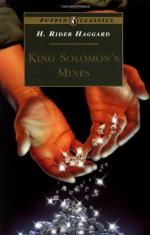On arriving before the nearest gate of Loo we found one of our regiments watching it in obedience to orders received from Ignosi. The other regiments were in the same way guarding the different exits to the town. The officer in command of this regiment saluted Ignosi as king, and informed him that Twala’s army had taken refuge in the town, whither Twala himself had also escaped, but he thought that they were thoroughly demoralised, and would surrender. Thereupon Ignosi, after taking counsel with us, sent forward heralds to each gate ordering the defenders to open, and promising on his royal word life and forgiveness to every soldier who laid down his arms, but saying that if they did not do so before nightfall he would certainly burn the town and all within its gates. This message was not without its effect. Half an hour later, amid the shouts and cheers of the Buffaloes, the bridge was dropped across the fosse, and the gates upon the further side were flung open.
Taking due precautions against treachery, we marched on into the town. All along the roadways stood thousands of dejected warriors, their heads drooping, and their shields and spears at their feet, who, headed by their officers, saluted Ignosi as king as he passed. On we marched, straight to Twala’s kraal. When we reached the great space, where a day or two previously we had seen the review and the witch hunt, we found it deserted. No, not quite deserted, for there, on the further side, in front of his hut, sat Twala himself, with but one attendant—Gagool.
It was a melancholy sight to see him seated, his battle-axe and shield by his side, his chin upon his mailed breast, with but one old crone for companion, and notwithstanding his crimes and misdeeds, a pang of compassion shot through me as I looked upon Twala thus “fallen from his high estate.” Not a soldier of all his armies, not a courtier out of the hundreds who had cringed round him, not even a solitary wife, remained to share his fate or halve the bitterness of his fall. Poor savage! he was learning the lesson which Fate teaches to most of us who live long enough, that the eyes of mankind are blind to the discredited, and that he who is defenceless and fallen finds few friends and little mercy. Nor, indeed, in this case did he deserve any.
Filing through the kraal gate, we marched across the open space to where the ex-king sat. When within about fifty yards of him the regiment was halted, and accompanied only by a small guard we advanced towards him, Gagool reviling us bitterly as we came. As we drew near, Twala, for the first time, lifted his plumed head, and fixed his one eye, which seemed to flash with suppressed fury almost as brightly as the great diamond bound round his forehead, upon his successful rival—Ignosi.
“Hail, O king!” he said, with bitter mockery; “thou who hast eaten of my bread, and now by the aid of the white man’s magic hast seduced my regiments and defeated mine army, hail! What fate hast thou in store for me, O king?”




